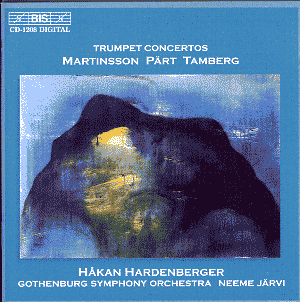In the true spirit of neighbourly cooperation here
is a disc that is very much a joint Swedish/Estonian effort. Swedish
label, orchestra, trumpet soloist and composer in Rolf Martinsson, coupled
with Estonian composers Arvo Pärt and Eino Tamberg and conductor
Neeme Järvi.
The solo Swedish composer represented, Rolf Martinsson,
studied with a number of composition teachers, amongst them Brian Ferneyhough,
although his own music in no way seems to embrace the ultra-complexities
of Ferneyhough himself. Instead Bridge, his Trumpet Concerto
No. 1, is aurally coherent, skilful in its scoring, big on melody
and ultimately a resounding tour de force of virtuosity, adrenalin and
exhilaration. The work is cast in three sections, played continuously
but "bridged" by two substantial cadenzas for the solo trumpet,
the first largely lyrical and muted, the second energetic and declamatory.
Martinsson has a vivid ear for effect and scoring, a feature that comes
through regularly as he pits soloist against orchestra in music that
can often progress from passages of combative challenge to waves of
bittersweet melody, almost Hollywood-like in their climactic lushness.
The piece was written in close collaboration with Hardenberger and draws
some fine, technically formidable playing from the soloist who is every
bit as exciting and exacting as you would expect from a master of contemporary
repertoire. The booklet notes mention that the work has been a real
hit with audiences and it is not difficult to see why. I found it difficult
to keep off the edge of my chair for much of the piece, particularly
the white-knuckle ride of the headlong last seven minutes.
Arvo Pärtís concise seven and a half minute Concerto
Piccolo über B-A-C-H could hardly be in starker contrast to
the Martinsson, embedded as it is in Pärtís most obvious neo-classical,
or in this case decidedly neo-baroque, style. That said it is the polystylism
of Alfred Schnittke that immediately comes to mind here, notably in
the scoring for strings, harpsichord and piano. The resemblance also
surfaces in the central slow movement where the progress of the touching
trumpet melody with its harpsichord accompaniment is rudely interrupted
by opposing dissonant chordal clusters from piano and strings. Although
all ends well as the trumpet melody finally returns to conclude the
slow movement unopposed, the spirit of uneasiness continues to permeate
the final Deciso. This is exorcised once again in the very concluding
bars where harmonic consonance returns to allow a positive and decidedly
bright flourish.
There is a feeling that Shostakovich is never too far
away in Eino Tambergís Trumpet Concerto No. 1 of 1972.
The driving, motoric rhythms that can often be heard in the opening
and concluding movements are one example but for the most obvious try
from around 1:40 in the first movement, in particular the bassoon line
from 2:20 followed by the string interjections and ensuing resumption
of the bassoon line on the piano. The influence is perhaps understandable
given Tambergís generation yet there is also much to admire here. His
writing for the solo instrument is striking and idiomatic, not to mention
imaginative in its occasional use of jazz techniques. A clear ability
to build and sustain musical tension comes through in the central Lento-Con
moto and the concluding Allegro molto provides much
to entertain before its unexpectedly calm conclusion.
Hardenberger is the perfect soloist for these works
and his input to the composition of the Martinsson and Pärt in
particular has no doubt greatly added to the composerís confidence in
producing trumpet parts of not inconsiderable flair. Järvi and
the Gothenburg Symphony Orchestra provide authoratative accompaniment
and the BIS sound is characteristically vivid. All in all, a disc that
will give much enjoyment.
Christopher Thomas
